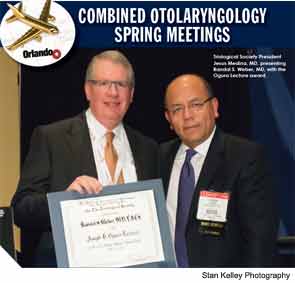Explore This Issue
May 2013
ORLANDO—Giving residents an earlier chance to explore early specialization in head and neck surgery during their residency might be one way to improve the educational system while helping to meet the demand for new surgeons in the discipline, said Randal S. Weber, MD, chair of the department of head and neck surgery at the University of Texas MD Anderson Cancer Center in Houston, as he delivered the Joseph H. Ogura Lecture here on April 12 at the 116th Annual Meeting of the Triological Society, held as part of the Combined Otolaryngology Spring Meetings. Click here to listen to the entire lecture.
In his lecture, entitled “Training Head and Neck Surgeons in the 21st Century: Is It Time for a New Paradigm?,” Dr. Weber said, “It’s time for a new look in how we educate.”
“There are two goals: We need to be able to place head and neck specialists into regional centers that are competent to deliver head and neck cancer care,” he said. “And we need to better prepare residents to enter fellowships followed by academic practice.”
Dr. Weber stressed that, although he is a director of the American Board of Otolaryngology and a member of the Residency Review Committee for the specialty, his comments represent his opinion and not those of either group.
Early specialization would help provide quality head and neck surgeons in both urban and rural settings, cut down or cut out training that doesn’t dovetail with a trainee’s goals and would make for a disease-focused approach in which surgeons could assume leading roles with care teams.
Care Quality
Dr. Weber’s proposal comes at a time when there’s an emphasis on higher quality care, a changing economic culture, a greater respect for a balance of lifestyle and career and an ever-expanding scope of knowledge, all of which make it more difficult to teach surgeons everything they need to know in the time they want to learn it.
Studies have found that the supply of quality head and neck surgeons might not keep up with demand, said Dr. Weber. New credentialing procedures and hospital privilege procedures will put more of an emphasis on performance, making the need for educational improvements even more glaring, he added.
“With the current educational model, we may not produce enough head and neck cancer specialists to meet the demand,” he said. “Surgical education is in evolution, both in how we teach and how we measure skill acquisition and competency.”
It’s also a matter of quality. Insurers will insist on quality care, and quality care needs to be available in all regions, not just those served by tertiary centers such as MD Anderson.
Proposed Model of Training
Dr. Weber proposed a modular system with a nine-month basic surgery period with training in neurosurgery, intensive care, general surgery and plastic surgery. That could be followed by an otolaryngology module of 36 months, with a broad educational experience in all of the otolaryngological subspecialties.
Then, those who wanted early specialization could move on to 18 months of a head and neck specialty module with a defined scope of knowledge, goals and objectives. The specialized areas could include radiology, pathology, speech and swallowing, advanced head and neck surgical techniques or other areas, Dr. Weber said.
Trainees would file a formal application and selection process. Dr. Weber said there would need to be an approval process for the early specialization modules from the Accreditation Council for Graduate Medical Education. The head and neck surgery subspecialty module would be a program recognized by the ABOto, those in the program would take a special exam and certification would be tied to their training, Dr. Weber proposed.
He said data would need to be collected to determine whether such a training option is really wanted, and suggested focus groups with trainees seeking fellowship training and surveys of current residents.
He acknowledged some potential downsides, saying it could lead to a fragmentation of the specialty, might prompt a desire for a certificate of added qualifications or board certification in head and neck surgery and might limit the scope of practice of a primary certificate holder.
He pointed to a precedent for early specialization in general surgery, in which the first four years of general surgery could be followed by subspecialty training, every year of which counts as credit toward general surgery training.
It’s a concept at least worth exploring further, he said. “I think the overarching rationale for this, at least from my perspective as a cancer specialist,” he said, “is to really improve the quality of head and neck cancer care. That’s the main rationale.”
Leave a Reply